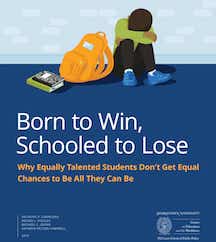 According to new research from the Georgetown University Center on Education and the Workforce and the Annie E. Casey Foundation, children who come from affluent backgrounds and have low school test scores are more likely than their less-affluent peers with high test scores to be in the highest quartile of socioeconomic status (SES) by the age of 25.
According to new research from the Georgetown University Center on Education and the Workforce and the Annie E. Casey Foundation, children who come from affluent backgrounds and have low school test scores are more likely than their less-affluent peers with high test scores to be in the highest quartile of socioeconomic status (SES) by the age of 25.
The report found that a child from a family in the highest quartile of SES who has low test scores in kindergarten has a 71 percent chance of being above-median SES at age 25. However, a child from a low SES family with high test scores has only a 31 percent chance of reaching above-median SES by age 25.
This achievement gap is even more severe when broken down by race. The researchers found that Black students who were in top half of math scores were 51 percent likely to earn a college degree within 10 years, compared to 62 percent of high-scoring White students.
In order to combat this disparity, the researchers believe that schools need to continue academic interventions throughout the K-12 years, improve and expand high school counseling, and ensure that talented low-SES students are given the same opportunities as their high-SES peers.
“The fact that children’s test scores go up and down over time shows that there is room for intervention,” said Megan L. Fasules, an assistant research professor and co-author of the report. “With smart policy changes, education can mitigate the effects of inequality.”
The full report, Born to Win, Schooled to Lose: Why Equally Talented Students Don’t Get Equal Chances to Be All They Can Be, may be accessed here.

